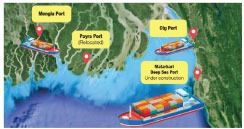- info@ficci.org.bd
- |
- +880248814801, +880248814802
- Contact Us
- |
- Become a Member
- |
- |
- |
- |
- |

The Digital Imperative for Bangladesh's Ports
In today's world, where global trade thrives on speed and efficiency, modern ports must adopt advanced telecom and connectivity infrastructure to stay competitive. Bangladesh, with vital maritime gateways like Chattogram, Mongla, Payra, and Matarbari, needs to leverage 5G private networks for Al-driven automation, smart logistics, and seamless trade operations. However, current telecom regulatory constraints require reform to facilitate private network deployment at ports and enhance the country's global competitiveness.
 Bangladesh's ports, handling over 90% of its international trade, face congestion, outdated infrastructure, and inefficient cargo handling. For instance, Chattogram Port's average container dwell time is about 9.16 days, compared to less than 2 days in Singapore. This highlights the need for modernization. Implementing 5G private networks can enable Al-driven automation, smart logistics, and efficient trade operations, boosting Bangladesh's global trade competitiveness.
Bangladesh's ports, handling over 90% of its international trade, face congestion, outdated infrastructure, and inefficient cargo handling. For instance, Chattogram Port's average container dwell time is about 9.16 days, compared to less than 2 days in Singapore. This highlights the need for modernization. Implementing 5G private networks can enable Al-driven automation, smart logistics, and efficient trade operations, boosting Bangladesh's global trade competitiveness.
Transforming Ports into High-Tech Logistics Hubs
Ports worldwide are evolving into high-tech logistics hubs, where Al-driven automation, loT-based tracking systems, and autonomous vehicles streamline operations. These advancements reduce congestion, enhance security, and optimize cargo management, ultimately leading to increased efficiency. Leading ports like Singa- pore and Rotterdam have embraced cutting-edge technologies, incorporating private 5G networks to facilitate seamless communication between systems, vehicles, and logistics chains. This digital shift allows for real-time monitoring, remote-controlled cranes, predictive maintenance, and Al-powered customs clearance, vastly improving operational efficiency. For Bangladesh to achieve similar success, its ports must undergo a similar digital transformation.
The Role of 5G Private Networks in Port Modernization
The backbone of any smart port is a robust, low-latency, high-speed network. A 5G private network provides dedicated, secure, and ultra-reliable connectivity, ensuring real-time data exchange for autonomous vehicles, Al-driven decision-making, and industrial loT applications. Deploying 5G private networks at Bangladesh's ports would enable:
• Real-time Al-driven operations, including automated cranes, Al-assisted logistics, and digital customs processing.
• Autonomous vehicles and drones, enhancing cargo handling and security surveillance.
• Remote monitoring and predictive maintenance, reducing downtime through proactive equipment servicing.
Ports like Singapore's PSA and Rotterdam's Maasvlakte II Terminal have already integrated private 5G networks, significantly improving their turnaround time, security, and efficiency. Bangladesh must follow suit to remain competitive in the global logistics arena.

Addressing Telecom Infrastructure Challenges
Despite its ambitions for digital transformation, Bangladesh's ports face major telecom infrastructure challenges:
• Low-speed networks and unreliable connectivity hinder Al and loT-driven operations.
• Lack of dedicated spectrum prevents seamless, high-speed communication within port facilities.
• Lack of clear provisions in telecom licensing policies delays private 5G network deployment, limiting technological advancements.
Currently, the regulations limit private 5G network rollouts for ports, forcing them to rely on public networks that lack the required speed, security, and reliability. This limits digital adoption and increases dependence on manual operations, reducing efficiency.
Policy Reforms: Unlocking Smart Port Connectivity
To drive modernization, Bangladesh must implement policy reforms that enable private 5G network deployment within port zones. Key actions include:
• Reforming telecom licensing framework to allow port authorities and neutral host operators to deploy private networks.
• Allocating dedicated 5G spectrum for industrial use, ensuring that port operations are not hindered by bandwidth congestion.
• Encouraging public-private partnerships (PPP) between telecom providers, port authorities, Neutral host providers, and the government to facilitate infrastructure and upgrades.
A Future Vision for Al-Enabled Smart Ports
The roadmap for Bangladesh's port transformation involves a collaborative effort between government agencies, telecom operators, logistics companies, and policymakers. With the right telecom infrastructure, Bangladesh can establish Al-powered, 5G-enabled ports that:
• Increase efficiency in cargo handling and clearance, reducing processing times from days to hours.
• Cut operational costs through automation, predictive maintenance, and digital logistics solutions.
• Enhance security via Al surveillance, loT sensors, and remote-controlled monitoring systems.
By integrating 5G private networks, Bangladesh's ports can evolve into world-class logistics hubs, attracting more foreign investment and boosting trade competitiveness.
Shaping the Future of Bangladesh's Trade and Commerce
Bangladesh's economic growth depends on its ability to modernize trade infrastructure and adopt cutting-edge technologies. It is time to drive regulatory changes that will empower the nation's ports to compete globally, enhance trade efficiency, and fuel future commerce. By embracing telecom and connectivity advancements, Bangladesh can position itself as a leader in maritime trade and logistics, ensuring sustainable economic growth in the years to come.





